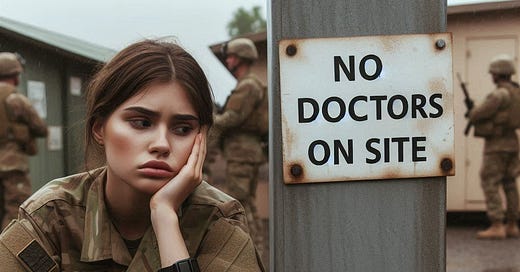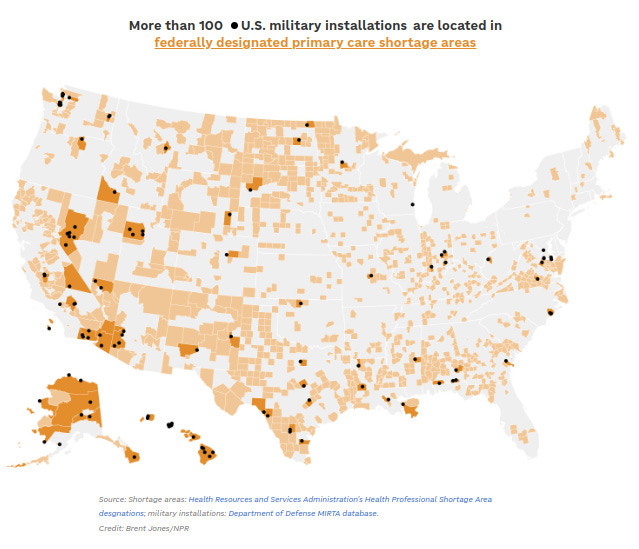A Good Day To Advocate for Better Healthcare
If there are subjects you’d like to see or improvements made, please let me know using the comment button below or send an email to healthcareadvocacy1@gmail.com
Claims denial is in work and so is a piece on the availability of psychiatric beds.
Videos of these newsletters appear on Youtube on this channel.
Military Medical Deserts
One of the reasons I am writing this story is that I am still fuming about the House of Representatives passing the Defense Authorization budget last week that denied travel time for those who have to seek abortion care away from their duty station because THE SUPREME COURT LEFT ABORTION CARE UP TO THE STATES - NOT THE PATIENT - NOT THE DOCTOR.
I am equally upset that my representative voted for the bill that contained that hateful amendment as well as anti DEI and LGBTQ language. Ok I’ll calm down and continue.
Systems that Pay for Healthcare
There are a lot of systems in play in the US that pay for our healthcare.
Pay as you go
Much of the world that operates this way - no money no treatment. India is like this for most people
Single Payer Insurance Trust
Traditional Medicare is this type of system. Lots of countries with Universal Healthcare use this kind of system. A government agency maintains the trust fund and pays claims.
Private Commercial Insurance
Employer provided plans, ACA plans, some Medicaid plans, Medicare Advantage (not real Medicare)
Includes in network and out of network considerations as well as copays and deductibles and prior authorizations for treatments
We are the only industrialized country whose healthcare is primarily dictated by what commercial insurers determine is appropriate for you.
Veterans Administration (VA)
The VA is similar to a nationalized healthcare system. The hospital, doctors and nurses all work for the single provider entity. Like a giant Health Maintenance Organization. The UK’s National Health System is this type.
Military Medical (Tricare)
Tricare insurance covers military service members, their families and retirees.
Medical Deserts for the Military
An NPR analysis found that 50% of active duty military installations stand within federally designated health professional shortage areas (HPSA). Those are places where medical services are hard to find — commonly called “health care deserts.”
It's incumbent on the military to make sure that when you send a family to a location, the support and resources are available to take care of them. And that obviously includes health care. Let’s remember that these are all volunteers who have chosen to protect us. If you mistreat volunteers, they disappear.
NPR mapped counties designated as shortage areas for primary care, mental health care and maternity care nationwide. Excluding National Guard installations, half the bases landed within at least one desert.
Three out of four bases in primary care deserts are also in either a mental health care desert, a maternal care desert, or both. By population, 1 in 3 U.S. troops and their families live in a health care desert.
For more than a decade, the Department of Defense has been trying to realign medical services, bringing the four branches of the military under one health agency with the aim of cutting costs and downsizing military treatment facilities. A big part was pushing family members away from treatment on base and out into the civilian community where they could use their Tricare health insurance.
Unfortunately, this is no longer viable. The combination of so many service members and families having to drive hours for care and low reimbursement rates to providers have made medical care difficult to find for those on half of US bases.
That means you might have to travel hours each way for medical care. That includes obstetrics and pediatric care.
Let me remind you that when such care is more than 30 minutes away the life of the pregnant person and baby are at risk.
If you need additional reading material on the subject here is a a DOD memo titled "Stabilizing and Improving the Military Health System." Issues with access to care and medical staff shortages on base have been documented by a DOD Inspector General's report.
Recommendations include boosting medical staff. Good idea but I have a better idea. You already know what it is. Universal Single Payer Healthcare.
Here’s why
Global budgets make sure that medical facilities costs are covered - that includes salaries.
Regional administrators have the authority to decide where the shortages are and have budgets and authority to boost capabilities to serve communities - that means building needed facilities in medical deserts and encouraging staff to move there.
The regional authorities also have the ability to make sure that reimbursements do not fall short and are fair - something Tricare has not done.
ACTION
Congress has the purse strings for the military - and soldiers and their families are bearing the brunt of this injustice. Call or email your Congressperson and Senators and the President and let them know about this sad state of affairs and that single payer universal healthcare can fix it.
Here is a link to the NPR story, https://www.npr.org/2024/06/13/g-s1-4187/military-bases-shortage-health-care-troops-army-navy-marines.
You can reach them here, https://www.usa.gov/elected-officials.
Or use RESISTBOT on your cell phone by texting SIGN PJOETN to 50409 to send this message.
“I am your constituent and I just learned that according to an NPR analysis 50% of military installations in the US are in military deserts. That means they lack primary, obstetric, and mental health care. Here is a link to the NPR story https://www.npr.org/2024/06/13/g-s1-4187/military-bases-shortage-health-care-troops-army-navy-marines.
Can you imagine being pregnant and having to drive hours to get to a prenatal or pediatric appointment EACH WAY?
There is insufficient care available on military bases, and the surrounding communities are not prepared to pick up the slack, and Tricare insurance pays horribly low reimbursement rates. The result is a nightmare for military families on half of our US bases.
Let me point out to you what a National Single Payer Healthcare system, like HR 3421, can do to fix this:
Global budgets make sure that medical facilities costs are covered - that includes salaries.
Regional administrators have the authority to decide where the shortages are and have budgets and authority to boost capabilities to serve communities - that means building needed facilities in medical deserts and encouraging staff to move there.
The regional authorities also have the ability to make sure that reimbursements do not fall short and are fair - something Tricare has not done.
Now it is up to you. I want you to support military families and all your constituents and cosponsor and support national single payer universal healthcare. We are ALL counting on you.”
Resources
Find My Elected Officials
Contact State and Federal Representatives - phone and email
Healthcare Advocacy (Us) Website
Our Newsletter resources including reproductive healthcare - Healthcare Advocacy Reading List
Important Healthcare Resources
League of Women Voters Healthcare Reform Toolkit
Organizations to Contact
National Nurses United Medicare4All
Physicians for a National Health Program
One Payer States
Healthcare Now
Reproductive Health
NARAL - Pro Choice America
Charley. chatbot abortion resource - make sure to use a secure incognito browser if you live in a state that has banned abortion
Planned Parenthood
Miscarriage and Abortion Hotline has references about where to procure abortion medications. They also assist women in the process of self managed abortion or miscarriage by phone or text and will respond in an hour. Details and hours of operation at their website.
United State of Women Reproductive health page (bottom of the page) has important resources such as medical support, access to Telehealth, prescriptions by mail, and legal support references.
Practice careful communications - The Digital Defense Fund has a number of tips to keep texts, calls, and internet use private. Here is their site.
If you need financial help with an abortion try abortionfunds.org
Claims Denials and Appeals & What to Do
Appeal a Healthcare Decision
Appeal/Negotiate a Hospital Bill
Disinformation Management
Cybersecurity Infrastructure Security Agency
Save Democracy
Chop Wood, Carry Water by Jessica Cravens
RESISTBOT
Link to the RESISTBOT site to learn more
Link to Chop Wood, Carry Water RESISTBOT write up
Learn About Healthcare Policy
The Kaiser Family Foundation has put together an online course about healthcare policy. It is called Health Policy 101. It is free and here is the link to their course page. I will keep this note here for a few days.
Thanks for reading Healthcare Advocacy! Subscribe for free to receive new posts





